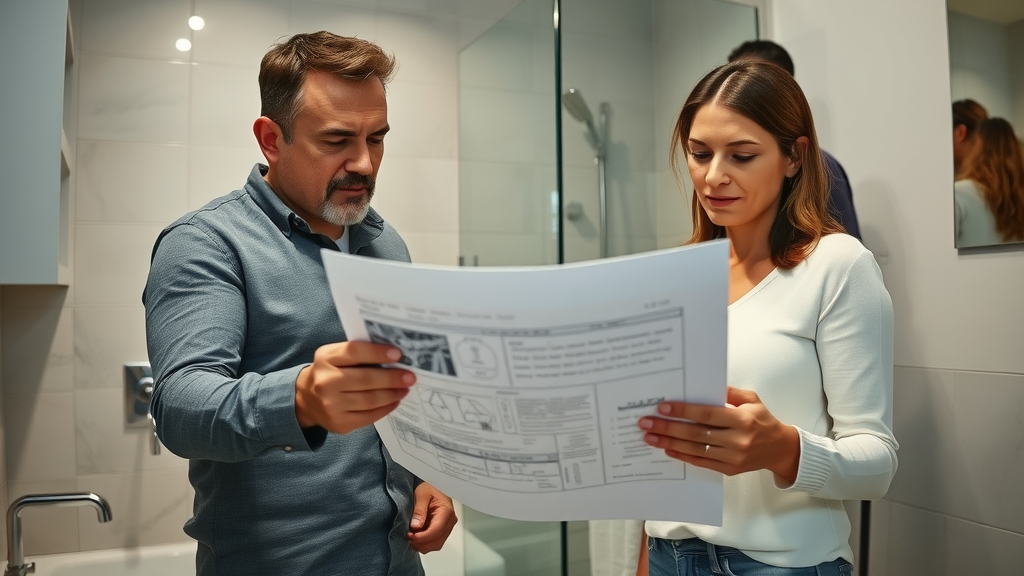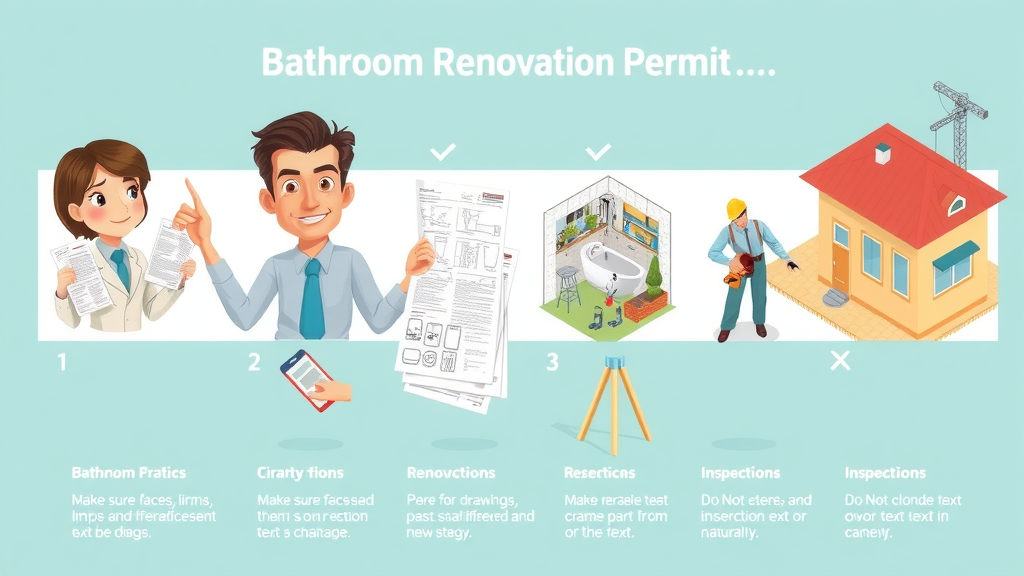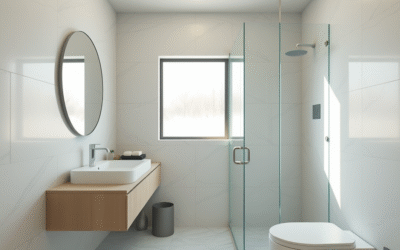Ever wondered if skipping a permit during your bathroom remodel could really cost you thousands? In New Jersey, navigating the rules for bathroom renovation permits is crucial—not only to stay compliant but to protect your investment and peace of mind. Whether you’re dreaming of a spa-inspired bathroom or tackling essential repairs, understanding how the permit process works is the key to a successful home renovation project. Read on to discover how to avoid expensive mistakes, delays, and legal headaches so your bathroom remodel goes off without a hitch.
Are Bathroom Renovation Permits New Jersey Often Overlooked? Discover What’s at Stake
Many New Jersey homeowners dive into home renovation projects without realizing the importance of securing proper bathroom renovation permits New Jersey requires. It’s tempting to think a bathroom remodel is a minor task, but state and local building departments treat these projects seriously because of their impact on your home’s safety, value, and compliance with the building code. From plumbing work to electrical upgrades, even small changes can legally necessitate a permit.
Overlooking permit requirements leads to more than just bureaucratic headaches. Without the correct building permits , you risk expensive stop work orders, insurance complications, and trouble reselling your house. Understanding when and why a permit is required ensures your project stays on track. Homeowners who recognize the value of the permit process protect both their property and peace of mind—while avoiding the frustration of costly delays and legal setbacks. Let’s explore why getting a permit is not just red tape, but an essential step in any successful home renovation.

-
Why bathroom renovation permits New Jersey are essential for any bathroom remodel or home renovation project
-
How to determine if your renovation project requires building permits
-
Key steps in the permit process for New Jersey
-
Common pitfalls in permit applications and how to avoid costly mistakes
-
Essential advice for communicating with your building department
Understanding Bathroom Renovation Permits New Jersey: When Are They Required?
Knowing when you need bathroom renovation permits New Jersey is the first critical step in the remodeling process. New Jersey municipalities enforce the state uniform construction code , which means any work affecting plumbing, electrical, or the structural components of your bathroom almost always require a permit. This isn’t just for major overhauls. Even converting a tub to a walk-in shower or relocating a toilet could trigger legal requirements.
Your local building department will clarify what qualifies as minor repairs versus a full bathroom remodel. Minor cosmetic updates—like painting, changing a faucet, or replacing cabinet hardware—usually don’t require permits. However, once you touch any plumbing or electrical work, or alter walls, the law becomes clear: you need an approved building permit. Overlapping projects, such as combining a kitchen remodel or broader home renovation with bathroom updates, further increase the likelihood you’ll require multiple permits.
Types of Renovation Projects That Need Building Permits
A wide range of renovation projects in New Jersey demand formal approval through the building department. Understanding these distinctions can save you time and trouble:
-
Bathroom remodel vs. minor repairs in New Jersey: Painting or fixture swaps typically don’t require a permit. However, tearing out or moving walls, converting a tub to a shower, or replacing a toilet with different plumbing often does.
-
Plumbing, electrical, and structural work triggers: Any changes to water lines, installing new outlets, or modifying framing or support beams require a permit as they directly affect health and safety.
-
Kitchen remodel overlaps: Kitchen remodeling projects that involve plumbing or electrical work may be reviewed alongside bathroom remodel permits for efficiency, but require separate applications.
-
Home renovation and bathroom remodeling project comparisons: Large-scale home remodeling projects that include bathroom upgrades will be scrutinized closely for building code adherence across all relevant permits.

Legal Requirements from the Building Department and Construction Permit Standards
The building department in your municipality is tasked with enforcing the uniform construction code of New Jersey. This ensures all bathroom remodeling projects meet minimum safety and quality standards. Standards cover not just what work should be done, but who may perform it—often requiring you to hire licensed and certified contractors for certain construction work.
According to New Jersey law, “New Jersey law mandates building permits for most bathroom remodeling projects that alter structural, plumbing, or electrical systems.” This means projects involving changes to walls, floors, pipes, or wiring will be flagged during the permit application process. Failing to comply could bring fines or require you to redo completed work, leading to frustrating and avoidable expenses as dictated by the state of New Jersey.
“New Jersey law mandates building permits for most bathroom remodeling projects that alter structural, plumbing, or electrical systems.”
The Step-By-Step Permit Process for Bathroom Renovation Permits New Jersey
Securing your bathroom renovation permits New Jersey doesn’t have to be overwhelming—if you know what’s required. The permit process involves thorough documentation, paperwork, and communication with your local building department. From your initial permit application to the final inspection, every step ensures your project complies with the state of New Jersey’s construction code , making your investment safe and legal.
Being prepared, organized, and proactive helps streamline your remodeling project and reduces delays. Let’s break down how to get your permits issued efficiently and what to expect at each stage.
How to Complete a Permit Application for Your Bathroom Remodeling Project
Submitting a complete and accurate permit application is crucial. Follow these steps for a smooth experience:
-
Gather necessary documents: Collect detailed plans, contractor credentials, and a full breakdown of proposed work. Ensure you have proof of your contractor’s state license, insurance information, and signed consent forms if necessary.
-
Submit to the local building department: Hand-deliver or upload your documents as directed by your municipality. Double check for missing signatures, incomplete fields, and ensure all contractor details are correct.
-
Check your home renovation project document checklist: Itemize all components of your bathroom remodel, including plumbing updates, electrical work, and even scheduled inspection dates. This organization will help prevent unexpected requests for additional paperwork later in the process.
Navigating Building Department Inspections for Bathroom Remodels
After your permit application is approved and work begins, the building department will perform one or more inspections throughout your bathroom remodeling project . Each stage—plumbing, electrical, and structural—must be signed off on before the project can move forward or be finished. Inspections are not just formalities: they are safety checks ensuring your construction work complies with current building code standards and protects future occupants.
Expect inspectors to review rough and final installations, verify all work is completed according to approved plans, and confirm the use of proper materials. Being present and cooperative during inspections accelerates the process and prevents the need for costly rework. A licensed contractor with experience in New Jersey permits can be invaluable during these stages, helping to answer questions and ensure all requirements have been met to keep your renovation project legal and compliant.

Timeline: How Long Do Bathroom Renovation Permits New Jersey Take?
Processing timelines for bathroom renovation permits New Jersey vary by municipality and project complexity. While simple bathroom remodels may be approved within days, more involved renovation projects with structural, plumbing, or electrical elements can extend the wait. Awareness of your county’s average processing times helps you set realistic expectations and better synchronize construction schedules with inspections, especially during busy home renovation seasons.
If your renovation project includes only minor work, certain townships may offer expedited routes, though larger counties like Bergen may still encounter volume-driven delays. Always submit your permit application well ahead of your anticipated start date and build extra time into your remodeling plan to address any unforeseen requests from your building department.
|
Sample Permit Timelines in Major NJ Counties |
||
|
County |
Avg. Processing Time |
Additional Notes |
|---|---|---|
|
Bergen |
2-4 weeks |
Heavy volume, allow extra time |
|
Middlesex |
1-3 weeks |
Expedited for minor remodels |
|
Camden |
1-2 weeks |
Usually prompt |
Consequences of Skipping Bathroom Renovation Permits New Jersey
Forgoing bathroom renovation permits New Jersey may seem like a shortcut to faster project completion, but the risks are severe. The building department has the authority to issue stop work orders, which will halt your construction project in its tracks—potentially leaving your bathroom in a partially demolished state. Worse, selling your home may become complicated if unpermitted work is discovered during the buyer’s due diligence process, resulting in demands to correct unapproved modifications or to re-do inspections.
Insurance companies generally void coverage for damages caused by unauthorized home renovation projects. This means that if water damage occurs in your newly remodeled, unpermitted bathroom, your claim may be denied outright. The penalties for infractions range from fines to mandatory demolition and reconstruction—costs that far exceed the price and effort of following the permit process from the start. Don’t let a shortcut today turn into tomorrow’s renovation nightmare.

-
Risk of stop work orders
-
Complications reselling your home renovation
-
Voided insurance for unauthorized bathroom remodeling project
“Unpermitted building work can result in severe fines and may jeopardize future real estate transactions.”
Most Frequently Overlooked Details in New Jersey Permit Applications
Even diligent homeowners can make mistakes when applying for bathroom renovation permits New Jersey . Avoiding common pitfalls is essential to a smooth approval:
-
Missing signatures or supporting documents
-
Failure to itemize all construction permit work in your scope
-
Not addressing electrical and plumbing updates specifically within your paperwork
Always review every line of your permit application, ask your local building department for a checklist, and make sure your remodeling contractor is involved throughout the process. Overlooking even minor details can delay approval, invite extra inspections, or result in project stoppages—so double-check everything before submission.
Professional Tips for a Smooth Bathroom Renovation Permits New Jersey Process
-
Partner with a licensed contractor experienced in the New Jersey permit process
-
Communicate regularly with your local building department to anticipate and address potential issues
-
Plan your bathroom remodeling project timeline around the inspection calendar to avoid delays
Hiring a professional with local expertise can make obtaining your bathroom renovation permits New Jersey faster and more predictable. Pros know the best ways to navigate permit requirements, can spot issues early, and help coordinate with inspectors. Regularly update your project schedule to account for potential holdups, and never hesitate to ask questions—staying proactive is the best safeguard against unexpected issues.

People Also Ask: Do I Need a Permit to Renovate My Bathroom in NJ?
-
In most cases, any significant bathroom remodel , including moving walls, updating plumbing, or electrical modifications, requires building permits in New Jersey. Always check with your municipal building department before starting any renovation project.
The short answer: If you’re altering plumbing, electrical, or structure, play it safe and apply for a permit. Each municipality in New Jersey may interpret minor work differently, but anything beyond surface-level changes almost always triggers the need for official review and approval.
People Also Ask: What Happens If You Do a Bathroom Remodel Without a Permit?
-
Renovating without proper bathroom renovation permits New Jersey can lead to mandatory removal of work, substantial fines, and potential legal or insurance issues for both home renovation and future resale.
Unauthorized work discovered during inspections or home appraisals typically requires not only fees and penalties, but may force you to dismantle finished projects for review. Insurers and realtors will expect proper documentation, so retaining full compliance protects both your investment and your ability to resell your property.
People Also Ask: What Electrical Work Can Be Done Without a Permit in NJ?
-
Generally, simple fixture replacements like swapping a light fixture do not require building permits, but any rewiring, adding new outlets, or changes to your electrical system as part of a bathroom remodel will require a bathroom renovation permit in New Jersey.
If your project involves adding or moving electrical components or running new wiring, a permit is almost certainly needed. Always clarify with your municipal inspectors if you are unsure; violations can have major consequences during and after the remodeling process .
People Also Ask: How Long Does It Take to Get a Permit for a Bathroom in NJ?
-
Bathroom renovation permits New Jersey can often be processed in as little as one week for simple bathroom remodels, but complex renovation projects involving plumbing and electrical upgrades may take up to four weeks or more.
Be proactive: apply early, maintain regular communication, and supply complete documentation to keep timelines on your side. If you plan ahead, even complex home renovation projects can begin quickly and with fewer surprises.

Visual guides and expert videos can clarify common errors, including missing forms, incomplete applications, and failing inspection scheduling. Watch these resources before starting your permit application or hiring a remodeling contractor to understand how to avoid the most typical setbacks in the permit process.
Essential FAQs: Bathroom Renovation Permits New Jersey
-
Can I obtain a building permit myself, or must I use a contractor? Homeowners can apply directly, but engaging a licensed contractor simplifies the process and can help avoid technical mistakes in paperwork and inspections.
-
Are permit fees different for a kitchen remodel versus a bathroom remodel? Yes—fees vary based on scope, complexity, and municipality. Kitchen remodeling projects that include plumbing or electrical work may have different cost structures from bathroom remodels.
-
When does a bathroom remodel require inspection? Whenever plumbing, electrical, or structural changes are involved, inspections are required at various stages to comply with construction code.
-
Are there statewide standards for bathroom remodeling project approvals in NJ? New Jersey enforces the Uniform Construction Code, but your local building department interprets and applies these rules. Always consult your municipality directly for project-specific requirements.
Key Insights Every Homeowner Should Remember About Bathroom Renovation Permits New Jersey
-
Always start with your local building department
-
Never underestimate the importance of the permit process
-
Keep thorough documentation throughout your renovation project
Ready to Secure Your Bathroom Renovation Permits New Jersey? Start Your Project without Delays
Take the first step today: Connect with your local building department, gather your documents, and avoid unnecessary delays or legal risks by following New Jersey’s rules for bathroom renovation permits. Your investment and your peace of mind are worth it!
When planning a bathroom renovation in New Jersey, it’s crucial to understand the permit requirements to ensure your project complies with state and local regulations. Generally, permits are necessary for significant changes, including structural modifications, plumbing, and electrical work. For instance, moving or altering plumbing fixtures, installing new electrical wiring, or making structural changes like removing walls all require permits. ( remodux.com )
Conversely, minor cosmetic updates such as painting, replacing tiles, or swapping out fixtures in their existing locations typically do not require permits. ( remodux.com )
It’s important to note that permit requirements can vary by municipality. Therefore, consulting your local building department before commencing any work is advisable to ensure full compliance with local regulations. ( bellarinj.com )
Failing to obtain the necessary permits can lead to fines, project delays, and complications during future property sales. Ensuring all work is properly permitted not only adheres to legal requirements but also safeguards your investment and the safety of your home. ( bellarinj.com )








0 Comments